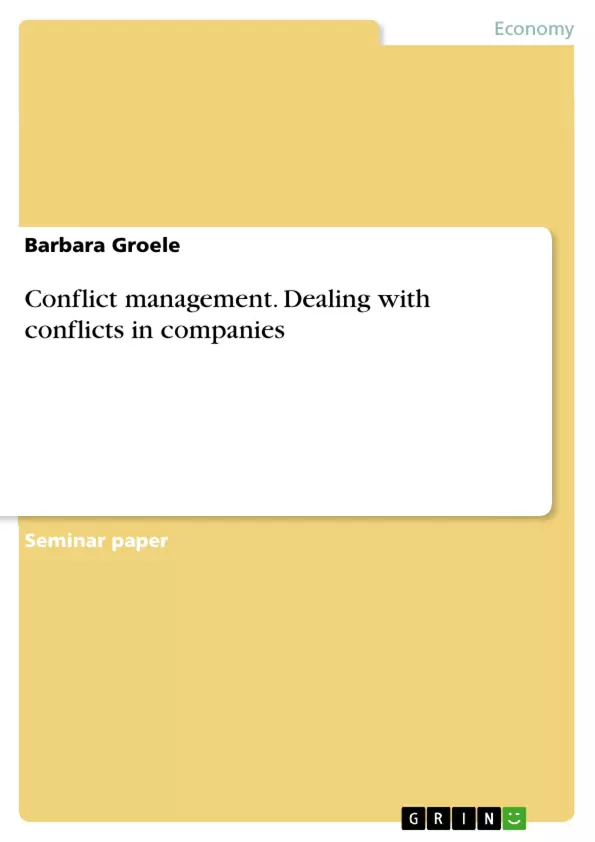Where people live and work together and want to achieve common goals, be it in the professional or private environment, conflicting interests and potential for conflict can arise at the same time. Conflicts are part of everyday life and are inevitable when people with different interests meet. They are side effects of every human coexistence. In today's age of increasing globalization, intensifying competition and internationalization, profit-oriented companies are also subject to a constant field of tension between pluralistic interests. Negative emotions are often associated with conflicts and conflicting interests, as they can lead to escalations, hardening and/or the postponement of one's own goals. In companies, conflicts and conflicting interests can have massive consequences for the company's success and thus also for cooperation, such as for example lockout, transfer and/or absenteeism. However, if the conflict opponents have negotiated their different interests and reached an agreement, conflicts can certainly also be used as a driving force. Accordingly, there are also opportunities in conflicts, e.g. for the beneficial further development of the company, the joint finding of an optimal solution and to increase entrepreneurial creativity.
Due to these facts, it makes sense for companies to analyze conflicts, to deal with the advantages and disadvantages and to initiate appropriate measures.
Inhaltsverzeichnis (Table of Contents)
- LIST OF ABBREVIATIONS.
- 1. INTRODUCTION.
- 1.1 PROBLEM STATEMENT.
- 1.2 STRUCTURE OF THE PAPER..
- 2 CONCEPTUAL DELIMITATION
- 2.1 CONFLICT
- 2.2 CONFLICT.
- 3 CONFLICT MANAGEMENT IN COMPANIES.
- 3.1 OBJECTIVES AND TASKS
- 3.2 INSTRUMENTS...
- 4 CONFLICT ANALYSIS IN COMPANIES
- 4.1 FORMS OF CONFLICT..
- 4.2 CAUSES OF CONFLICT
- 4.3 CONFLICT ESCALATIONS
- 5 CONFLICT RESOLUTION
- 5.1 STRATEGIES FOR CONFLICT MANAGEMENT..
- 5.2 CONFLICT ASSESSMENT AND RESOLUTION IN COMPANIES
- 6. CONCLUSION.
- BIBLIOGRAPHY
Zielsetzung und Themenschwerpunkte (Objectives and Key Themes)
This seminar paper aims to provide an understanding of conflicts, particularly in the context of businesses, and to outline effective conflict management strategies. It explores the concept of conflict and its management in detail, examining key objectives, tasks, and instruments involved in the process. The paper further delves into the analysis of conflicts within companies, identifying forms, causes, and potential escalations. It concludes by presenting conflict resolution measures, including strategies for conflict management, assessment, and resolution.
- Definition and Conceptualization of Conflict
- Conflict Management in Companies
- Conflict Analysis and its Key Factors
- Conflict Resolution Strategies and Methods
- Effective Conflict Management in a Business Context
Zusammenfassung der Kapitel (Chapter Summaries)
- Chapter 1: Introduction This chapter provides a brief overview of the paper's focus on conflict and its impact on businesses. It highlights the importance of understanding and managing conflict in today's competitive landscape.
- Chapter 2: Conceptual Delimitation This chapter defines the terms "conflict" and "conflict management," laying the foundation for the subsequent analysis. It discusses the nature of conflict, its causes, and its potential implications in various settings.
- Chapter 3: Conflict Management in Companies This chapter examines the objectives, tasks, and instruments involved in managing conflict within organizations. It explores the critical role of conflict management in maintaining a productive and harmonious work environment.
- Chapter 4: Conflict Analysis in Companies This chapter delves into the analysis of conflicts within companies, identifying various forms of conflict, their causes, and potential escalations. It provides insights into the dynamics of conflict within organizational structures.
- Chapter 5: Conflict Resolution This chapter focuses on the strategies and methods used to resolve conflicts. It explores different approaches to conflict management and examines the process of conflict assessment and resolution within businesses.
Schlüsselwörter (Keywords)
The main focus of this work lies on the understanding and management of conflict in companies. Key concepts include conflict definition, conflict management strategies, conflict analysis in companies, conflict resolution techniques, and the overall impact of conflict on business success.
Frequently Asked Questions
What are the main objectives of conflict management in companies?
The main objectives include maintaining a productive work environment, preventing escalations like absenteeism or lockouts, and leveraging different interests as a driving force for innovation and entrepreneurial creativity.
How are conflicts defined in a business context?
Conflicts are viewed as inevitable side effects of human coexistence where pluralistic interests meet. In companies, they represent a field of tension between profit-oriented goals and individual interests.
What are the potential negative consequences of unmanaged conflicts?
Unmanaged conflicts can lead to emotional hardening, the postponement of company goals, and massive operational issues such as transfers, lockouts, and increased absenteeism.
What are the common causes of conflict within organizations?
Common causes include differing interests, increasing globalization, intensifying competition, and the natural friction that occurs when people with diverse backgrounds work toward common goals.
Can conflicts have positive effects on a company?
Yes, if negotiated effectively, conflicts can lead to beneficial further development, the finding of optimal solutions, and an increase in overall entrepreneurial creativity.
What are the key steps in conflict analysis?
Conflict analysis involves identifying the specific forms of conflict, understanding the underlying causes, and monitoring potential escalations to initiate appropriate countermeasures.
- Citar trabajo
- Barbara Groele (Autor), 2007, Conflict management. Dealing with conflicts in companies, Múnich, GRIN Verlag, https://www.grin.com/document/1172313



